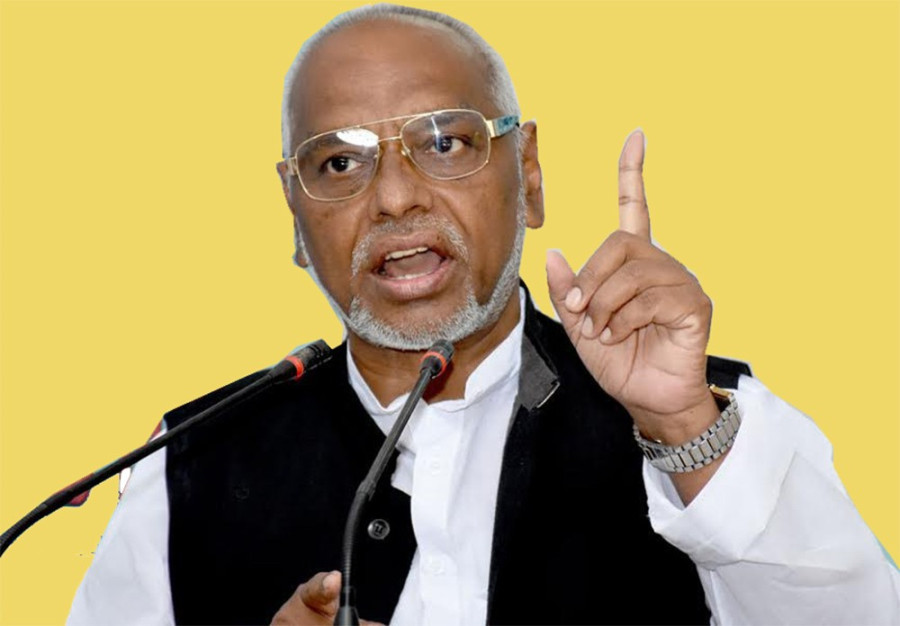Politics
Would Mahato’s exit from LSP bring any substantive change in national politics?
Mahato aims to set up an ‘alternative’ political force whose goal is to establish a ‘pluralistic nation-state’.
Post Report
Rajendra Mahato, a key leader of Loktantrik Samajbadi Party, quit the organisation on Monday and announced his new campaign, Rastriya Mukti Andolan, literally the ‘national liberation movement’.
Mahato had been expressing his dissatisfaction with party chairman Mahantha Thakur but after the latter refused to heed his grievances, Mahato severed ties with the party. And so on Monday, Mahato announced that he would now work for the oppressed and marginalised communities through his new endeavour.
Arguing that the country needs another movement to emancipate the oppressed and marginalised people, Mahato called on all sections of the society, including his former party leaders and cadres, to join his movement. The Mahato-led Andolan had already protested in some areas in Kathmandu as a pilot project, bringing in general people, mostly from the Janajati and Adivasi clusters.
Mahato advocates for sub-national identity to uplift the social, economic, and political status of the oppressed and marginalised communities.
“The Madheshi people struggled for six months after the promulgation of the constitution in 2015 but we could not win,” Mahato said during the press conference held to announce his decision on Monday. “So the country needs another movement that incorporates those oppressed and marginalised communities. Hence, I call on all the stakeholders concerned to join our movement.”
After quitting the party, Mahato, along with his team members, will impart training to individuals from the marginalised communities, especially on what exactly his movement entails and aims to achieve, Keshav Jha, who has been supporting Mahato since his early days in the Janata Samajbadi Party, told the Post.
On Wednesday, the Rastriya Mukti Andolan is holding a protest in Kathmandu’s Maitighar, which has been prohibited for protests and mass meetings.
“We will continue with different kinds of protests and demonstrations for the oppressed and marginalised communities,” Jha said. “Once we establish our agendas in society, we will form a party.”
But Nepal already has several political parties, civil society organisations, and other groups that advocate for the marginalised and oppressed communities. So how will Mahato’s movement stand out from the crowd? Will it bring any substantive change or will it, like so many parties and organisations of yore, walk the same old well-trodden path?
The very existence of the Loktantrik Samajbadi Party was threatened by its “groups of chairmen”, said Brikhesh Chandra Lal, who separated from Loktantrik Samajbadi Party in February 2022. “I cannot predict what changes Mahato could bring after his separation from the party,” Lal said.
Mahato, who is 65, started his political career with the Nepal Sadbhawana Party established by the late Gajendra Narayan Singh. Mahato later went on to form the Sadbhawana Party but it could not bring about any substantive changes in the landscape of Madheshi politics. Mahato then joined hands with Thakur to form the Rastriya Janata Party, which saw a bitter power struggle between the two leaders. The party merged with Upendra Yadav’s Samajbadi Party but the outfit did not last for long given the triangular power struggle between Yadav, Mahato and Thakur. Thakur and Mahato then formed the Loktantrik Samajbadi Party in August 2021.
A man with a chequered past, Mahato is an impatient, career-oriented, and desperate leader, said a leader who knows him closely. “Over time, his differences with Thakur grew because the latter refused to hand over power or commit the next leadership of the party to Mahato,” the leaders said.
While announcing the new movement on Monday, Mahato hinted that he would seek to expand his base beyond Madhesh, his stronghold. His vision paper stated that he would focus on the rights of the marginalised and oppressed people and set up an “alternative” political force whose goal is to establish a “pluralistic nation-state”. The paper further said that anyone who agreed with that agenda could join the movement.
“We came to know that political elites have opted for the strategy of divide and rule,” Mahato said at the press conference. “We fought for thirty years after 1990. We have now understood the mentality of the political establishment. So we have announced the new movement for the emancipation of the oppressed and marginalised people. We expect all big and small parties to join in this new movement that aims to set up a pluralistic nation-state.”
Lal, Mahato’s one-time party colleague who is now tying up with the Hridayesh Tripathi-led People’s Progressive Party, said that people in Madhesh are looking for a dedicated leader who is committed to their agenda. “So his [Mahato’s] departure doesn’t trigger any shockwave or inspire any enthusiasm inside Madhesi politics,” Lal said.
“Now people in Madhesh are well aware of their agenda because there is now a lot of political and social awareness inside the society. But the way one after another political parties are splitting, it will weaken the agenda of Madhesi politics.”
Vijay Kant Karna, former ambassador and chairman of the Center for Social Innovation and Foreign Policy, said that Mahato’s departure from the Loktantrik Samajbadi Party will weaken the agenda of Madhesh and the strength of Madhesh-based political parties.
“He will revive his old group, that’s the other thing, but splitting the political parties one after another will cause fragmentation in the Madheshi movement, and weaken its agenda,” Karna said.
“His departure means, Loktantrik Samajbadi Party will die out gradually. More Loktantrik Samajbadi Party leaders will join other parties like CK Raut’s Janamat Party, Upendra Yadav’s Janata Samajbadi Party, and other parties.”
Karna added that this trend of splits and divisions will weaken the Madheshi politics and movement. “Frequent splits of political parties will cause fragmentation and division in their agenda, movement and strength,” he said.




 10.12°C Kathmandu
10.12°C Kathmandu














